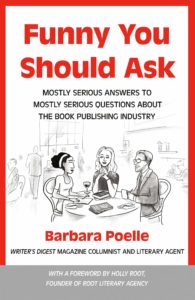When I first came to work at Writer’s Digest, as an editorial assistant fresh out of college, I had a boss who didn’t mince words. I learned this right away when I asked a question in a staff meeting and she swiftly answered, “Look it up,” and kept right on talking.
I was chagrined, of course… until I realized this reply was not reserved for me as the newcomer. My coworkers had all suffered their fair share of look it ups and, though the rebuke might seem a bit harsh in the moment, the more we heard it, the more we took it to heart. Because never once did she direct us to look up an answer that could not be easily found. When our meetings were reserved for necessary discussion, debate, and collaboration, everyone came more prepared, less time was wasted, and the outcomes were far more productive—and creative.
Although my own communication style is not so brusque, I think of this every time I open my inbox or call on a raised hand at a conference only to be met with a general, basic question such as “What’s an agent do, anyway?” or “How do you pitch a book idea?” or “How many words should my manuscript be?” (Ask any published author: We get these all the time.)
To be clear, I answer these questions as warmly as I can. We’ve all been there, at the starting line or looking to pivot in a new, unfamiliar direction. But if it were possible to convey warmth in a reply that would truly be the most helpful one I could give? I would say this:
Look it up.
Not because it’s not in my best interest for me to field this question.
Because it’s not in yours.
Doing Your Homework
There are entire books and websites (hint: you’re reading an award-winning one right now!) devoted to things like how to write a good query letter or a nonfiction book proposal, and how an agent fits into your career goals (or doesn’t). We’ve put thousands of collective hours of time and thought into Career Authors, in fact, to be sure that resources like this one give you much, much more and better information than any speaker can in 5 minutes off the cuff.
But that doesn’t mean there’s nothing you can’t just type into an internet search bar. Every writer has had light bulb experiences throughout their career, and disappointments, and pleasant surprises, and things they wish they’d known all along. It’s a trial-by-fire craft: We learn as we go, which means we can learn from each other’s mistakes, too.
That is what you should be asking the professional standing before you (and why so many of us feel passionate about teaching), or on the receiving end of your email.
Visit any writers group on Facebook, and you will find that no matter what topic members post about in their search for help, advice, or info, people will answer. We writers are by and large a generous bunch, and there’s no such thing as a wrong or stupid question. But the things someone could have easily found out on their own will get a handful of redundant, short replies.
The thoughtful ones? Where it’s clear the writer has done her homework and now is ready to roll up their sleeves and dig in? Those are the posts where the discussion really gets going in the comments.
It’s complicated. It depends. I wrestled with that too… The questions with no easy answer are the ones where the writers who take the time to weigh in end up learning something new too.
Those are the questions that unearth the gold.
Getting Better Answers in 3 Easy Steps
- The next time you’re mustering the courage to raise your hand and ask a question of a speaker or an instructor, ask yourself if it’s something you could easily look up. If it is, see if you can think of a better question—the one you’ll be kicking yourself later for not asking while you had the chance. The one you’d really love to have this particular person’s perspective on for a good reason.
- Know that in any forum, the more thoughtful your question, the more thoughtful the answers will be. When you’re respectful of what you’re asking people to take the time to answer, you’re not merely being courteous to them, but you’re making the best use of your own time (and opportunity) as well.
- When in doubt, do ask. The question you’re a little scared to say in front of anyone? Maybe it’s too emotional, or too subjective, or too specific to your scenario? That is the one you are not going to be able to look up and find the answer to some other way. It’s the perfect one to ask when you have the floor, and an experienced professional’s ear. (And whatever it is, it’s not silly. I promise.)
Could I give a couple examples of how this plays out in real life? Excellent question!
- Look it up: What exactly is genre fiction?
- Ask: I’m not sure whether my suspense novel would be classified as mystery or thriller. Do you know of a litmus test that might help me decide what to call it in my query, and will I hurt my own chances if I use the wrong term?
- Look it up: How do historical novelists get started?
- Ask: When you’re basing a story on true historical events, how do you bridge the gap between being true to history and reimagining your own version through your characters’ eyes?
- Look it up: Should I think about changing the names of people mentioned in my memoir?
- Ask: How did your family and friends react when you published this book, and is there anything you wish you’d discussed with them in advance?
Taking Advantage of Every Opportunity
 The fact that so many publishing professionals are accessible and open with their advice is one of the best things about the writing community, hands down. Once I worked my way up to that chief editor’s desk at Writer’s Digest, one of the things I was most excited about was our addition of an advice column—not stuffy Q&A, but down-to-earth straight talk with a pro. Thus “Funny You Should Ask” was born—written by the hilarious and wise Irene Goodman Literary Agency VP Barbara Poelle (who—spoiler alert—would later become my own agent), it’s now one of the magazine’s most popular and long-running columns. As of this year it’s also a book by the same name: a great resource that allows you to look it up and ask the expert at the same time. We at Career Authors are going to help you do both by giving away a copy!
The fact that so many publishing professionals are accessible and open with their advice is one of the best things about the writing community, hands down. Once I worked my way up to that chief editor’s desk at Writer’s Digest, one of the things I was most excited about was our addition of an advice column—not stuffy Q&A, but down-to-earth straight talk with a pro. Thus “Funny You Should Ask” was born—written by the hilarious and wise Irene Goodman Literary Agency VP Barbara Poelle (who—spoiler alert—would later become my own agent), it’s now one of the magazine’s most popular and long-running columns. As of this year it’s also a book by the same name: a great resource that allows you to look it up and ask the expert at the same time. We at Career Authors are going to help you do both by giving away a copy!
To enter, just use the entry form below—you can even come back and do it again tomorrow to increase your odds of winning! Share the love: Tell a friend. And if this post has left you with a writing or publishing question, hop on over to our Facebook page. Our Career Authors team is happy to answer.





